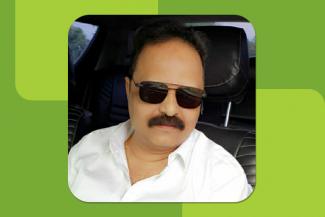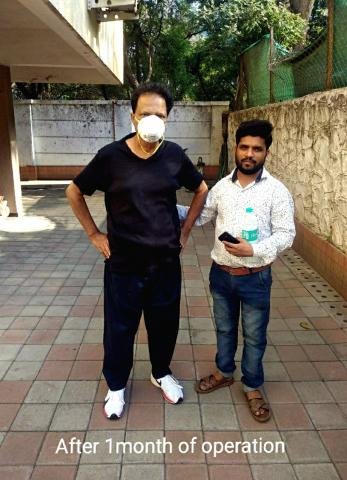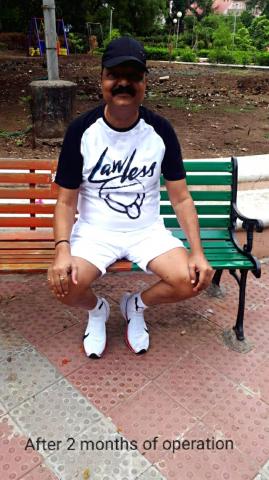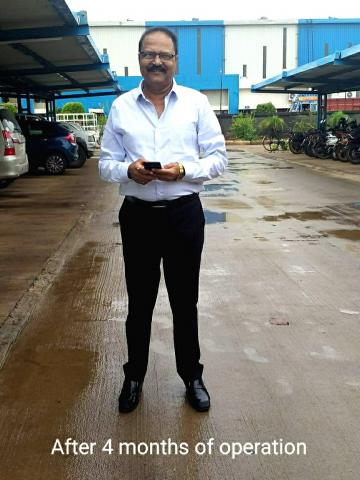
A routine health check led to a diagnosis of fatty liver followed by MASH and eventually a liver transplant. Mahindrasingh Bhardwaj, 56 from Nagpur, India shares his journey , the complications and the strategies that worked for him.
The Diagnoses:
During my annual health check-up in 2016, I was told that I have a fatty liver. I was 98 kilos at the time and so was advised to lose weight and start exercising. The recommendation was medications and weight loss of 15 kilos. I immediately started going to the gym and walking every morning. However, I was only able to lose 6 kilos. A few months later, I could feel that my stomach was getting heavier and bigger. No matter what I did, the heaviness didn’t subside. I told my doctor at the time and he referred me to visiting faculty. Every week, doctors from Mumbai come to my local hospital in Nagpur. I went to see Dr Mohanka, one such liver specialist visiting from the Global hospital in Mumbai. On examining me, he suggested I come to Mumbai for a complete work-up and testing. I travelled to Mumbai that same week and after a battery of tests. I was diagnosed with MASH.
Medications were started immediately and I was told to wait and see if my distended belly went down. Nothing happened. In July of 2018, I was additionally detected with the Hepatitis B virus. Everything seemed to come crashing down together! It was now November of 2018 with no improvement in my health. The transplant surgeon sat me down and told me that a liver transplant was now necessary. Even though, I did regular check-ups, my Hepatitis was recognised very late because it was asymptomatic. However, my liver had shrunk so much that I had no option but to go for a new organ all transplant. Soon the ball started rolling on trying to find a suitable donor. Since my wife and sons did not provide a match for me, we had to get listed in the national registry.
The Transplant:
I was very trusting of my doctor and that eased the entire process for me. He explained in detail the procedure and risks to me before the surgery and I was adamant that only he operate on me. There was never any hesitation or nervousness on my behalf! My wife has been my biggest support and strength. She was very confident and would tell me that nothing would go wrong. So we were prepared!
On the night of April 2019, I received the call from the Aditya Birla hospital in Pune. They had a found a cadaver liver that was a match for me. I jumped in the car with my oldest son and headed for Pune. There was no time to waste! My doctor and his team from Mumbai also reached Pune to operate on me the same night. I was wheeled into surgery in the middle of the night.
Related Reading: My Brother Donated His Liver
Recovery:
It was at a normal pace and my doctors were happy. I was able to get up and walk around from day 4 after the transplant. My urinary catheter and fluid collecting bag were also pulled out by the 25th or 30th day. I was in the hospital for about 15 days and then moved to a rental flat in Pune for the next 3 months. Every week, I had to go to the hospital for wound care and monitoring of all my liver functions. The biggest threat to the patient after a transplant is rejected of the donor organ, so they kept a close eye on things.

Complications:
My Blood Pressure would shoot up occasionally during the months post surgery. It would go up to 160/100 at times. I think that it may possibly be due to stress.
My blood glucose levels had also increased post-op due to the steroid medications, which I was put on. I was switched to insulin and that helped regulated my blood sugar levels. I am a diabetic since 10 years and never had any issue with my blood sugar levelsMy fasting level is usually around 120 to 130 mg/dl.

Dietary changes:
Post surgery, I was put on a strict protein rich diet. I used to eat only boiled or grilled protein such as chicken, fish or eggs with soup. I was also started on protein powder. Absolutely no sweets or fruits were allowed. I continue to be on a high protein diet but have recently re-introduced rice and wheat bread (roti) in to my meals.
My biggest challenge has been losing weight! I first started gaining weight when I was 45 years old. I was diagnosed with Type II Diabetes around the same time. Since my glucose levels were under control, I was never prescribed any weight loss. That only happened when my fatty liver was diagnosed. I was 93 prior to the transplant and then post surgery, went down to 70 kilos but am back up to 82 kilos now. I do my walking but need to join a Gym because my doctor has told me to drop it down to 75 kilos. There is no history of obesity in my family.
I used to be a smoker and drink alcohol occasionally. I left both those vices about 9 years ago.
Family history:
My mother also had MASH (earlier called NASH) and hepatitis B and she finally succumb to liver cirrhosis in 2009. My father died of stroke in 2007. My grandparents, uncles, and brothers all have Diabetes.
Present condition:
At present, I am comfortable and go for my monthly follow-up with my doctor in Nagpur. Going forward, I have no major concerns because I have no complaints regarding my new liver. My heart is doing okay and my diabetes is under control too. I am back to working full time since I run my own Business. I am happy to tell people and other patients about my journey and inspire them to be positive.

Advice:
My general advice to everyone is that after the age of 50, make sure to get an annual health check-up done. I have urged so many people to do the same and often illnesses and health problems are detected early because of early screening. It can truly save you a lot of pain and suffering later on. Early diagnosis also helps with early treatment. So don’t wait till the last minute, because it not only saves money but also may save your life.
My advice to other patients who have had or may have a liver transplant is:
- Be confident! Don’t be afraid about how it will be.
- Trust your doctor. Find a doctor who is willing to take time and explain your illness to you. Most doctors just prescribe medications and lifestyle changes without providing explanations and this is not helpful to the patient at all.
- Focus on a high protein diet, it is indeed very helpful for recovery.






